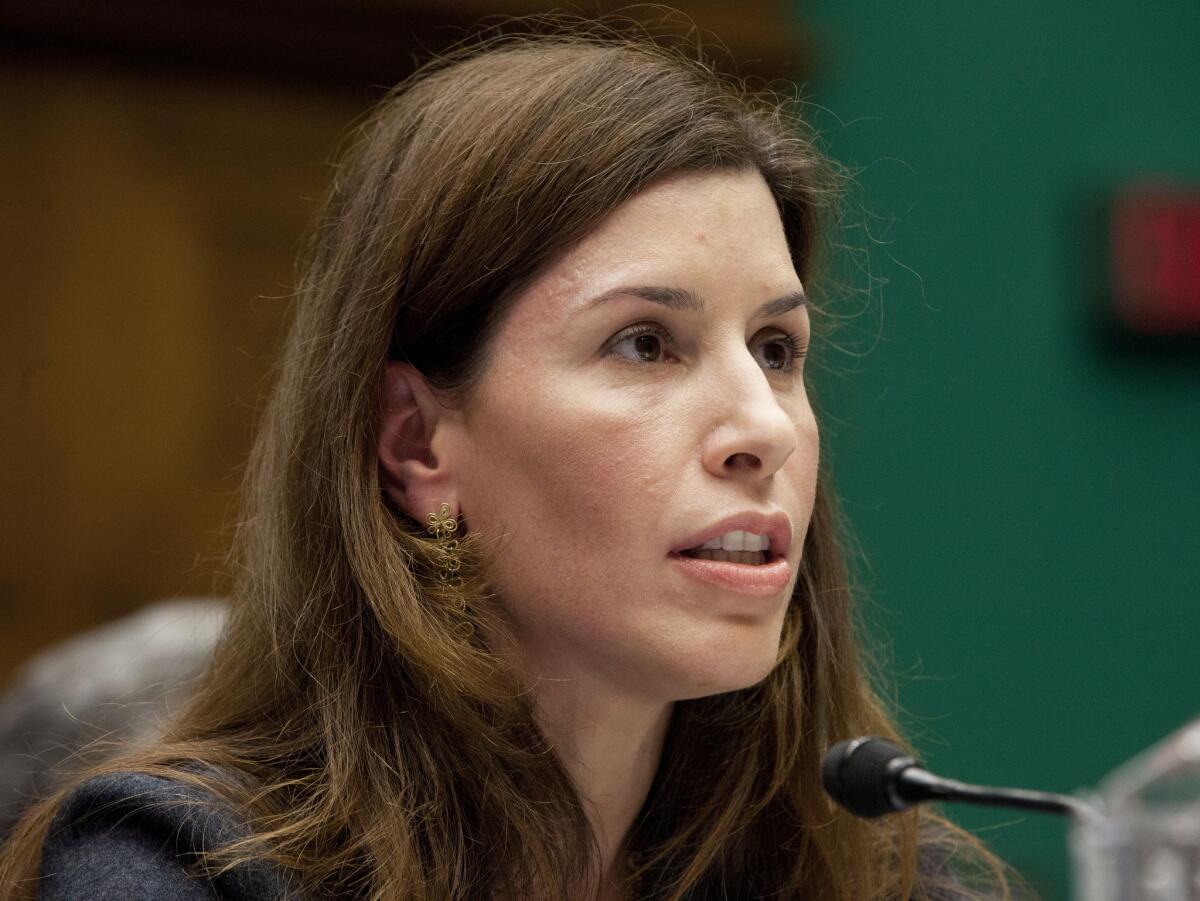FDA officials defend use of placebos during Ebola drug trials

- Share via
FDA officials speaking at a tropical medicine conference Wednesday said experimental Ebola drugs should be tested in randomized controlled trials -- a “gold standard” form of drug assessment that involves giving some ill patients a sham treatment, or placebo.
Addressing reporters at a session of the American Society of Tropical Medicine and Hygiene in New Orleans, U.S. Food and Drug Administration officials said randomized controlled trials were the only way to truly determine whether any of a number of experimental Ebola treatments were effective.
“We have an obligation to provide a lot more than hope,” said Dr. Luciana Borio, the FDA’s assistant commissioner for counter-terrorism policy and director of the Office of Counterterrorism and Emerging Threats.
As the Ebola death toll in West Africa nears 5,000, heated debate has erupted among medical experts and aid groups over the best method to roll out experimental treatments.
In a randomized controlled trial, or RCT, patients are divided into separate groups, with one receiving the experimental drug and the other receiving a placebo. By comparing the health of the two groups, researchers can determine if the experimental treatment works or even causes harm.
Recently, a group of scientists including Peter Piot, an Ebola expert who helped discover the virus, wrote in the journal the Lancet that this approach was unsuitable in the current crisis.
“We accept that RCTs can generate strong evidence in ordinary circumstances; not, however, in the midst of the worst Ebola epidemic in history,” the authors wrote. They instead advocate the use of observational studies, conducted in parallel, at different locations.
Among other objections, the researchers said the use of placebos could further undermine trust in authority in a region where the social order is breaking down because of disease, poverty and the aftermath of civil war.
On Wednesday however, Borio and Dr. Edward Cox, director of the FDA’s Office of Antimicrobial Products, argued that randomized controlled trials would not only determine a drug’s effectiveness, they would also deliver improved supportive care to patients in Africa.
“Randomized controlled trials will be, or can be, a very informative way to study a product,” Cox said. “Yes, there are a range of opinions about such trials, but it’s important to keep in mind that in the trial, all patients would get best available supportive therapy.... The expectation is that the care that would be delivered in a trial, in the best supportive care arm, would actually provide patients with benefit.”
Cox also said that without a control group, it would be very difficult to determine whether an experimental drug was causing an adverse effect or whether the adverse affect was caused by the underlying disease.
In the case of Ebola, effective supportive care -- replenishment of fluids, blood products and monitoring of electrolytes -- is thought to increase a patient’s odds of survival. The patient fatality rate in West Africa is just over 70%, but it is far lower in the West, where resources for supportive care are significantly greater.
The FDA is prohibited from naming experimental products that are under review, Cox said. However, officials at the World Health Organization have said that a handful of drugs are being considered for use. Phase I safety trials are also underway for two experimental vaccines, which are intended to boost immunity to Ebola prior to infection.
Two months ago, the WHO said it was ethical to use experimental Ebola drugs in the current crisis. Since then, drug manufacturers have struggled to boost production of compounds such as ZMapp and others, while experts have debated the protocols for their use.
In addition to experimental drugs, the WHO approved the use of whole blood transfusions and serum therapies as another experimental treatment. Though a number of Ebola patients who have been treated in Western nations have received blood antibodies from Ebola survivors, that approach has yet to see widespread use in Africa.
“The bottom line is that we don’t really know whether it helps and to what degree it helps, and logistically it’s quite difficult to implement on a large scale,” Borio said Wednesday. “Like any other therapeutic, ideally we’d be able to study them in an appropriately designed trial so that we can actually learn its benefits.”
As experts continue to debate the terms of experimental drug use, an epidemiologist who has worked in Sierra Leone -- one of the three hardest-hit nations -- worried that there might not be adequate staff to conduct any trials in Africa.
“I think the linchpin on the ground for me is: We don’t have local staff there that are showing up, that are given the same protection and the same benefits that people coming from overseas are also given,” said Lina Moses of Tulane University’s Ebola task force.
“Until we provide those assurances, we’re not going to have people to deliver these vaccines or monitor people in these trials,” Moses said.
During the panel discussion with reporters, Dr. Alan Magill, president of the ASTMH, addressed a controversial decision by Louisiana officials to bar people from attending the tropical disease conference if they had visited an Ebola-affected nation in the last 21 days - the incubation period of the disease.
Magill said 30 people did not attend the conference as a result of the advisory issued by the Louisiana Department of Health and Hospitals.
When asked if the tropical medicine conference would ever return to New Orleans as a result, Magill said:
“I think the first response from many individuals was a bit of an emotional one, which was to say, ‘No we shouldn’t come back,’ ” Magill said. “I think my leadership response is: We’re going to have a great meeting while we’re here and then we’ll reassess the options as we go forward in the next several months as cooler heads prevail.”
Follow @montemorin for science news






